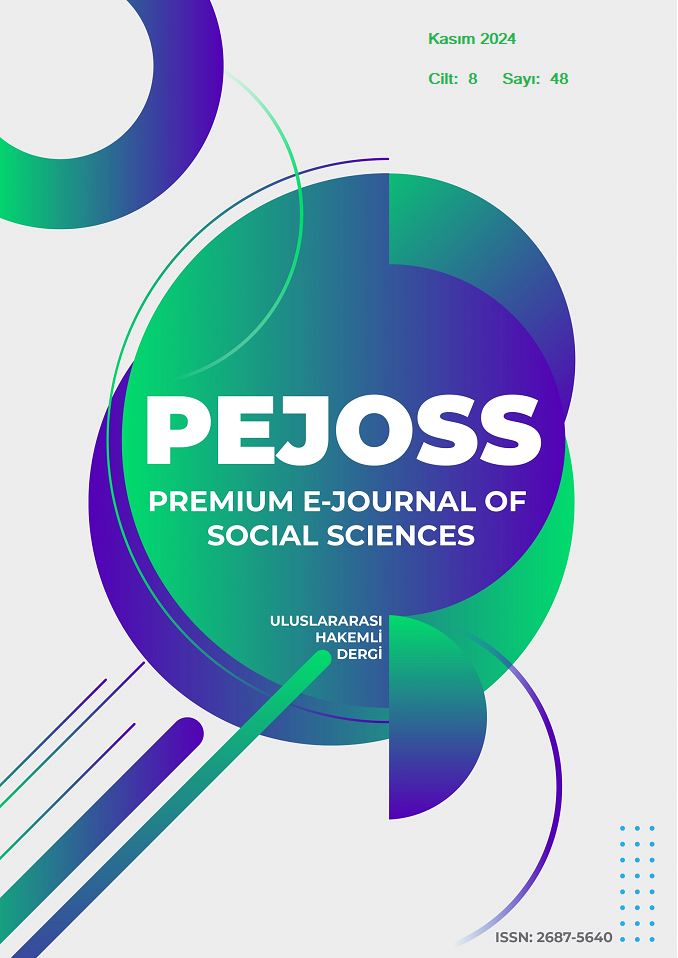Byung-Chul Han and Politics of Pain
DOI:
https://doi.org/10.5281/zenodo.12618547Keywords:
Byung-Chul Han, Pain, Palliative, Beauty, Society, InformationAbstract
One of the social characteristics of our age is algophobia. The fear or avoidance of pain is a universal condition. All issues that cause pain are removed from life. From personal relations to social relations and from art to politics, an escape from pain is reflected in every field in which people are involved appears as the dominant element in this age. In his work Palliative Society, Byung-Chul Han, a German philosopher of South Korean origin, exposes the problems caused by the elimination of pain from life. According to Han, palliative society is the inevitable result of the neoliberal technological system. In the political arena, the avoidance of conflict in the name of liberal consensus appears as the loss of democracy. In the pandemic period, the neoliberal virus politics applied in the name of naked survival also eliminates the meaning of life. Furthermore, lockdown and isolation from all social relations are some of the dominant political imperatives of the pandemic period. The loss of sociality is, in a way, the loss of life. In the technological dimension, life, which is compressed into "like" and "share" through social media, is evolving into a dictatorship of positivity. Throughout history, dictatorship has always manifested itself in pressure, seclusion and negativity. In our time, the situation is different, even completely opposite. Dictatorship manifests itself in freedom, positivity and liking. Byung-Chul Han describes this new situation as the dictatorship of positivity in a palliative society. As Byung-Chul Han argues, the erasure of pain and negativity from life reduces human beings to a one-dimension. The human who avoids pain, death, negativity and roughness is the absolutisation of health. This results, in a world dominated by pleasure, happiness and health a world which, according to Nietzsche, is ruled by "the last man". However, Han argues that what makes life meaningful is the presence of antagonism and the coexistence of opposing elements, which he sees as a basic necessity of human life. In this paper, the focus will be on Byung-Chul Han's analyses of the politics of suffering, specifically as outlined in his work Palliative Society. Additionally, Han's concepts such as "transparency," "positivity," "beauty," and "information" will be spelled out within the context of their relationships with each other.
Downloads
References
Benjamin, W. (1978). Reflections: Essays, Aphorisms, Autobiographical Writings. Edmund Jephcott (Trans.). Harcourt Brace Jovanovich Publishers.
Breton, D. L. (2015). Acının Antropolojisi. İsmail Yerguz (Çev.). Sel Yayıncılık.
Chul Han, B. (2015). Yorgunluk Toplumu. Samet Yalçın (Çev.). Açılım Kitap.
Chul Han, B. (2017). Şeffaflık Toplumu. Haluk Barışcan (Çev.). Metis Yayıncılık.
Chul Han, B. (2018). Güzeli Kurtarmak. Kadir Filiz (Çev.). İnsan Yayınları.
Chul Han, B. (2019). Psikopolitika Neoliberalizm ve Yeni İktidar Teknikleri. Haluk Barışcan (Çev.). Metis Yayıncılık.
Chul Han, B. (2022a). Palyatif Toplum Günümüzde Acı. Haluk Barışcan (Çev.). Metis Yayıncılık.
Chul Han, B. (2022b). Enfokrasi, Dijitalleşme ve Demokrasinin Krizi. Mustafa Özdemir (Çev.). Ketebe Yayıncılık.
Gönüler, Y. (2016, 22 Nisan). Hız Bir Uyuşturucudur ahali, Ruhun İçin Yavaşla! https://www.dunyabizim.com/hiz-bir-uyusturucudur-ahali-ruhun-icin-yavasla-makale,1250.html
Kandemir, F. (2020). Rabbim Bana yardım Et!. İlahiyat Yayınları.
Heidegger, M. (2001). Nietzsche’nin Tanrı Öldü Sözü ve Dünya Resimler Çağı. Levent Özşar (Çev.). Asa Yayınları.
Heidegger, M. (2006). Varlık ve Zaman. Kaan H. Ökten (Çev.). Agora Kitaplığı.
Marcuse, H. (1986). Tek-Boyutlu İnsan. Aziz Yardımlı (Çev.). İdea Yayınları.
Mouffe, C. (2015). Dünyayı Politik Düşünmek, Agonistik Siyaset. Murat Bozluolcay (Çev.). İletişim Yayınları.
Nietzsche, F. (2003). Şen Bilim. Levent Özşar (Çev.). Asa Kitabevi.
Nietzsche, F. (2005). Putların Batışı Ya Da Çekiçle Felsefe Nasıl Yapılır. Mustafa Tüzel (Çev.). İthaki Yayınları.
Peters, F. (2004). Antik Yunan Felsefesi Terimleri Sözlüğü. Hakkı Hünler (Çev.). Paradigma Yayınları.
Rey, R. (1998). The History of Pain. Louise Elliott Wallece and J.A. Cadden and S. W. Cadden (Trans.). Harvard University Press.
Downloads
Published
How to Cite
Issue
Section
License
Copyright (c) 2024 Premium e-Journal of Social Science (PEJOSS)

This work is licensed under a Creative Commons Attribution 4.0 International License.


